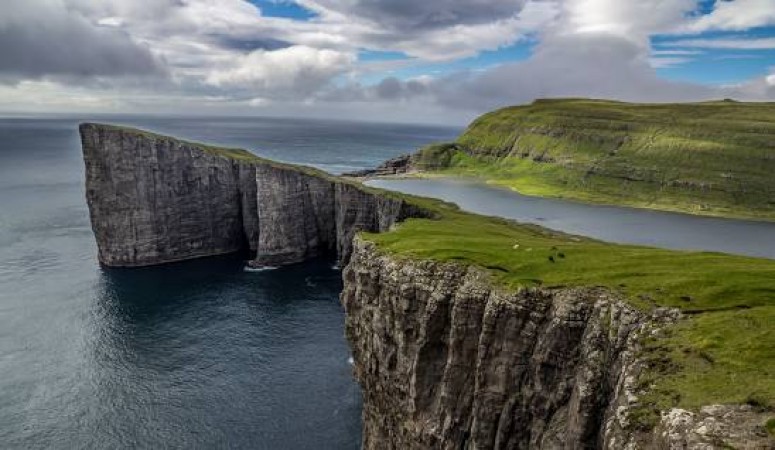
Nestled in the North Atlantic Ocean, halfway between Iceland and Norway, the Faroe Islands are a remote and enchanting Nordic archipelago that captivates travelers with its rugged landscapes, picturesque villages, and a rich cultural heritage that dates back centuries. Despite being off the beaten path, the Faroe Islands offer a unique and unforgettable experience for those seeking a glimpse of untouched natural beauty and traditional island life. The Faroe Islands are a true testament to the power of nature's sculpting hands. Rugged cliffs, soaring mountains, and cascading waterfalls dominate the landscape, creating a breathtaking setting for adventurers and nature enthusiasts. The Sørvágsvatn Lake, perched high above the ocean, offers an optical illusion of floating on the edge of a cliff, while the Múlafossur waterfall dramatically plunges from a cliff into the sea, leaving visitors in awe of its majestic beauty.
The Faroese villages exude a sense of tranquility and charm, reflecting the islanders' close connection to their surroundings. Houses with grass-covered roofs, colorful wooden buildings, and charming harbors create postcard-perfect scenes in every village. The islanders' traditions, deeply rooted in their Norse heritage, are kept alive through traditional dance, music, and festivals, offering visitors a unique insight into the islanders' way of life. The Faroe Islands are home to more sheep than people, with an estimated 80,000 sheep roaming freely across the archipelago. These woolly creatures play a vital role in the Faroese economy and culture, providing wool for traditional handicrafts and meat for local cuisine. The islands are also a haven for birdwatchers, as they serve as nesting sites for a vast array of seabirds, including puffins, gannets, and fulmars.
The Faroe Islands' weather is as diverse as its landscapes, with frequent changes in conditions that can range from calm and sunny to stormy and misty within a matter of minutes. This unpredictable weather adds to the islands' mystique and allure, making every moment a unique experience for visitors. Faroese cuisine is deeply rooted in the islands' maritime heritage, with a focus on fish and seafood. The Faroese have their unique way of preparing and preserving fish, such as drying and fermenting fish in the open air. Skerpikjøt, the traditional Faroese dried mutton, is a delicacy that reflects the islanders' resourceful nature in utilizing their natural resources. The Faroe Islands place a strong emphasis on sustainable tourism and preserving their fragile ecosystems. Visitors are encouraged to adhere to the principles of responsible travel, respecting the local customs, wildlife, and landscapes. The islands offer numerous opportunities for eco-friendly activities, such as hiking, birdwatching, and fishing, allowing visitors to experience the natural beauty of the Faroes without leaving a negative impact.
In conclusion, the Faroe Islands are a hidden gem in the North Atlantic, offering an escape into a world of untamed beauty, ancient traditions, and captivating landscapes. From its majestic cliffs and cascading waterfalls to its vibrant villages and rich cultural heritage, the Faroe Islands invite travelers to immerse themselves in a journey of exploration and discovery. As one of the last untouched frontiers of Europe, this remote Nordic archipelago promises an unforgettable experience for those seeking an authentic and extraordinary adventure amidst nature's most dramatic and pristine wonders.
Also read -Gold Coast, Queenland: Emerges as Top Tourist Destination
Malibu, California: A Coastal Gem of Endless Beauty and Celestial Appeal